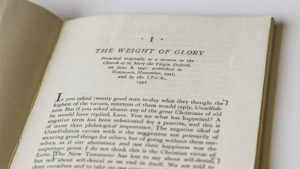Your eyes will see the King in His beauty; They will behold a far-distant land. Isaiah 33:17
All true beauty resides in God and in the works of His hands. There is a longing in those who have submitted their lives to Him to see the fulfillment of true beauty someday.
C. S. Lewis expressed it in his own unique way in “The Weight of Glory,” one of the greatest of all his essays, originally a sermon delivered during WWII from the pulpit of Oxford’s Church of the Virgin Mary.

He notes that God has already given us glimpses of what one day we will see when we no longer look through the veil of this world.
God has given us the Morning Star already: you can go and enjoy the gift on many fine mornings if you get up early enough. What more, you may ask, do we want?
Ah, but we want so much more—something the books on aesthetics take little notice of. But the poets and the mythologies know all about it.
The external sense of sight is only the beginning for “seeing” the depth of God’s beauty. There is a longing that goes to the essence of what beauty is:
We do not want merely to see beauty, though, God knows, even that is bounty enough. We want something else which can hardly be put into words—to be united with the beauty we see, to pass into it, to receive it into ourselves, to bathe in it, to become part of it.
We attempt to put it into words. The poets try via what Lewis calls “such lovely falsehoods.” What does he mean?
They talk as if the west wind could really sweep into a human soul; but it can’t.
They tell us the “beauty born of murmuring sound” will pass into a human face; but it won’t. Or not yet.
That little sentence—Or not yet—performs the transition in Lewis’s sermon.
For if we take the imagery of Scripture seriously, if we believe that God will one day give us the Morning Star and cause us to put on the splendour of the sun, then we may surmise that both the ancient myths and the modern poetry, so false as history, may be very near the truth as prophecy.
 “The Weight of Glory” has so many poignant passages, but the next one Lewis offers can send a splendid thrill up one’s spine if we read it correctly and enter into what he is saying. It should be read slowly, taking into ourselves each word and phrase:
“The Weight of Glory” has so many poignant passages, but the next one Lewis offers can send a splendid thrill up one’s spine if we read it correctly and enter into what he is saying. It should be read slowly, taking into ourselves each word and phrase:
At present we are on the outside of the world, the wrong side of the door. We discern the freshness and purity of morning, but they do not make us fresh and pure. We cannot mingle with the splendours we see.
But all the leaves of the New Testament are rustling with the rumour that it will not always be so. Some day, God willing, we shall get in.
And what a glorious Day that will be.
